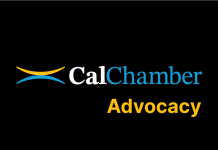 An effort led by the California Chamber of Commerce with the support of a large coalition of allied groups has resulted in passage of two bills that will provide employers with significant and much-needed economic relief as the pandemic continues.
An effort led by the California Chamber of Commerce with the support of a large coalition of allied groups has resulted in passage of two bills that will provide employers with significant and much-needed economic relief as the pandemic continues.
It is expected the Governor will soon sign AB 87 (Assembly Committee on Budget) and SB 113 (Senate Committee on Budget and Fiscal Review) as early action items in the 2022-23 State Budget. Both measures will restore the net operating loss (NOL) deduction and lift the cap on business incentive tax credits that were suspended and capped in the 2020-21 budget via AB 85. In July 2020, the Legislature approved the Governor’s proposal to suspend the use of personal and business NOLs and limit the use of existing business tax credits to offset their tax liability for years 2020-2022 as a way to stave off a looming deficit triggered by the fallout of COVID-19.
The deficit never materialized. Instead, California experienced a generational surplus in 2021 that allowed for additional education funding and other spending, and the ability to maintain strong reserves. The 2022 economic outlook remains just as strong with a massive budget surplus on the horizon. Accordingly, the tax increases adopted in 2020 as an emergency response are no longer needed. AB 87 and SB 113 will sunset the last year of the suspension and cap, and assist employers in their economic recovery, incentivizing them to remain in California.
A recent report from the Milken Institute found that suspending the research and development (R&D) tax credit “increased cost uncertainty for businesses at a time when economic volatility was already high. For three decades, this incentive had helped businesses lower the risks inherent to investing in product and process improvements, but the policy change signaled a diminished commitment to innovation-led growth.” Restoring the R&D tax credit, along with the ability to utilize NOL carryforwards, and other business incentives, would signal to employers that the state is committed to a stable investment climate for companies that want to make a commitment to California.
In addition to the tax provisions, AB 87 and SB 113 will transfer $150 million into the California Emergency Relief Fund to fund remaining eligible waitlisted grant applicants from last year’s California Small Business COVID-19 Relief Grant Program. The California Small Business Relief Grant Program was created in November 2020 and received more than 300,000 applications, demonstrating just how vital these funds are to California’s struggling businesses. These bills also conform state tax law to federal tax law for entities that received grants from Restaurant Revitalization Fund and Shuttered Venue Operations programs, so these entities will avoid state tax obligations that they don’t shoulder federally.
Passage of CalChamber-supported AB 87 and SB 113 sends a positive message to the state’s employers that they are important to our government.
Staff Contact: Preston Young


